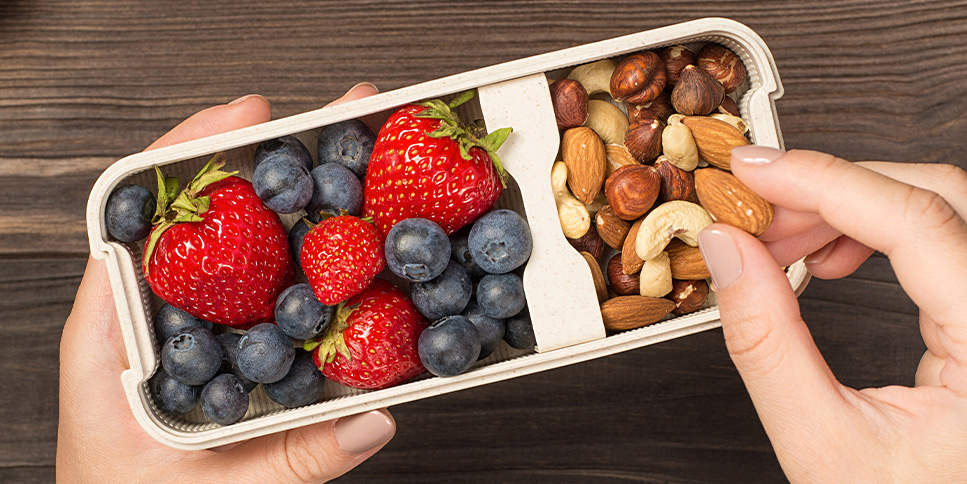There’s a lot of noise out there when it comes to dieting for weight loss. So much so that one survey revealed that 52% of Americans said that they think it’s easier to do their own taxes than it is to figure out how to eat healthier.
While that may come as a huge surprise to some of you, we kind of get it. One day, we’re told to eat a particular food. Then the next day we’re told not to eat that same food. This can leave us scratching our heads, wondering, what healthy lifestyle advice should we actually listen to vs. what advice should we ignore?
To help you cut through a lot of the noise that’s out there, let’s take a closer look at some common myths about dieting. This way, you’ll be able to make some tweaks in your daily eating and physical activity habits in order to achieve and maintain a healthy weight.
5 Of The Biggest Myths About Dieting
Myth #1: It’s Impossible To Lose Weight
Over 70% of Americans don’t believe that they can achieve their weight-loss goals, according to a national survey.
While losing weight and keeping it off isn’t always easy, research shows that it’s not impossible. In fact, 10,000 individuals who have lost “significant amounts of weight and kept it off for long periods of time” have proven that it is indeed possible to lose weight and keep it off.
Myth #2: Carbs Make You Gain Weight
Yes, research shows that low-carb diets can aid weight loss, and that they’re effective for people with obesity, metabolic syndrome, and type 2 diabetes, but that doesn’t mean that all carbs cause weight gain.
Complex carbs, such as whole wheat bread, brown rice, beans, and fruit, are actually good for you when you consume the appropriate amount. After all, carbs give your body energy, vitamins, such as iron, calcium, and B vitamins, and fiber to support your digestion and help you feel fuller for longer.
That said, refined carbs or simple carbs (found in foods like cookies and candy) lack vitamins, minerals, and fiber and are linked to weight gain. So, focus on consuming more complex carbs, while limiting refined or simple carbs.
Myth #3: Eating Fat Makes You Fat
While fats are more energy-dense than carbohydrates and proteins – nine calories in every gram of fat versus four calories per gram for carbs and proteins – dietary fats are still an essential element of a healthy diet since they give your body energy and support cell function.
The four major dietary fats in foods are saturated fats, trans fats, monounsaturated fats, and polyunsaturated fats. Saturated fats and trans fats are considered “bad fats” since a diet high in saturated fats and trans fats can raise bad cholesterol (LDL) levels in your blood. On the other hand, monounsaturated fats and polyunsaturated fats are known as “good fats” because they are good for your heart, your cholesterol, and your overall health. For that reason, avocadoes, nuts, seeds, and fish rich in omega-3 fatty acids are generally considered as welcomed parts of a balanced diet.
Bottom Line: As long as your calorie intake is within a healthy range, fat does not make you fat.
Myth #4: “Low Fat” and Diet Foods Are Healthier For You
A consumer survey revealed that over one in three people seek out “low fat” or “reduced fat” foods and beverages, with dairy being the most common food category for low-fat options.
However, findings from a study, “A systematic comparison of sugar content in low-fat vs regular versions of food,” suggests that foods lower in fat have higher sugar content despite having lower calories. The study notes that even though the increase in added sugar per serving appears to be small, the cumulative effect of consuming “empty calories” over a number of years could have important health consequences since consuming excess sugar (even in small amounts) has been shown to be harmful, leading to weight gain, diabetes, and cardiovascular disease.
“Ironically, individuals who believe they are choosing healthier versions of their favorite foods are trading fat for less healthy sugar,” according to the study. “Although exchanging sugar for fat alone may not increase rates of obesity as shown in a recent systematic review, eating food high in sugar may promote consumption of excess calories by inducing leptin resistance and increasing the risk of obesity.”
That’s why some experts suggest enjoying small amounts of foods like full-fat yogurt, cheese, and nut butter, and steering clear of “low fat” and diet foods.
Myth #5: Eating Late At Night Causes Weight Gain
The saying, “Eat after eight, and you’ll gain weight,” sure is catchy, but it just isn’t true. Eating late at night has been associated with weight gain due to the myth that the body cannot properly metabolize food during sleep. However, research shows that the body has intricate systems of metabolizing, storing, and using energy from food.
Also, the conventional wisdom today is that a calorie is a calorie, regardless of when you eat it. That’s because weight gain is caused by eating more calories than you burn. So, at the end of the day, as long as you don’t eat more than your recommended daily intake of calories, eating late won’t make you gain weight.
*The links used in this article are being provided as a convenience and for informational purposes only; they do not constitute an endorsement or an approval by Iovate Health Sciences International Inc. or any of its affiliates (“Iovate”) of any of the products, services or opinions of the corporation or organization or individual. Iovate bears no responsibility for the accuracy, legality or content of the external site or for that of subsequent links. Contact the external site for answers to questions regarding its content.







